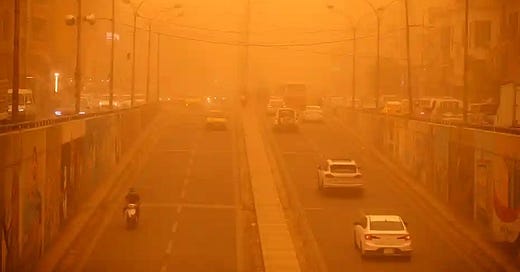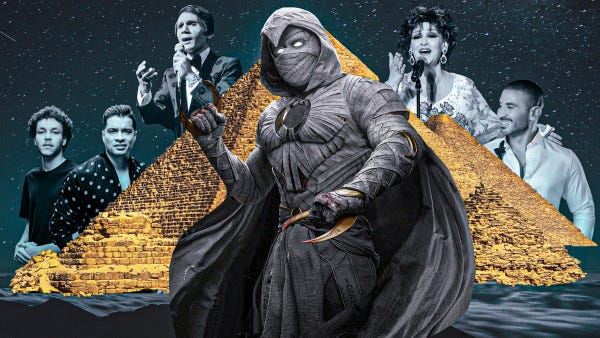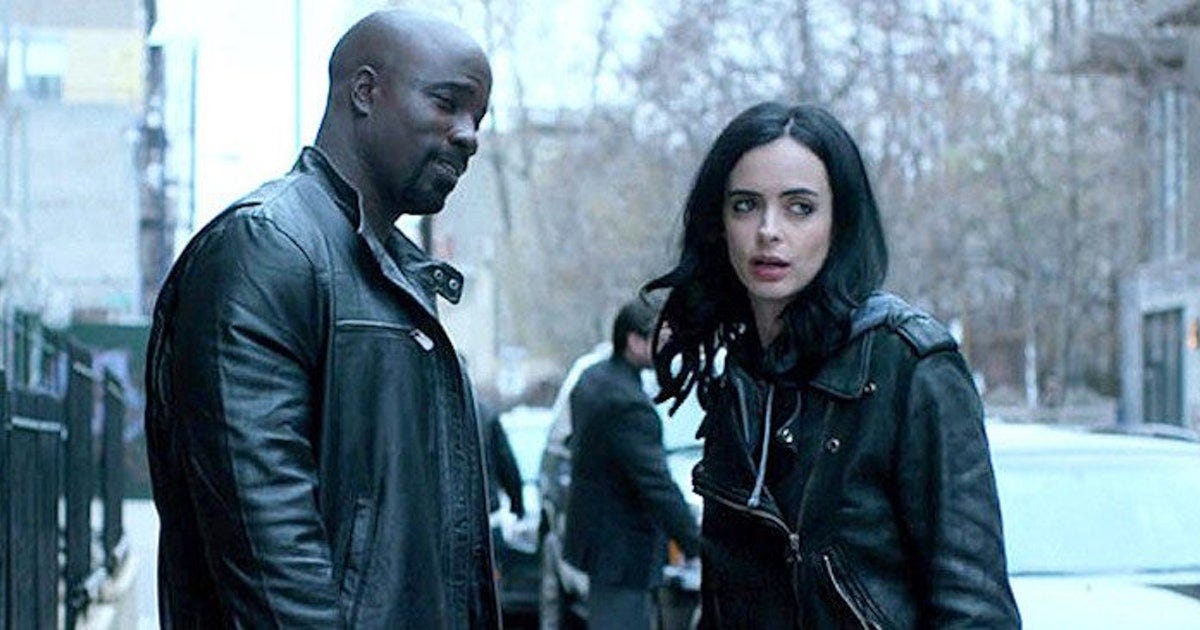Good morning! Every Friday, I spotlight interesting new publications in the general area of MENA Political Science - journal articles, special issues, policy reports, whatever caught my eye. I hope you find it useful!
Environmental Politics in the MENA (POMEPS STUDIES 46, May 2022), edited by Jeannie Sowers and Marc Lynch
The effects of climate change in the Middle East are impossible to ignore: record setting heat in Kuwait, drought wrecking agriculture in Iraq and Iran, desertification, dust storms like the ones . Climate change is only part of the broader range of environmental problems facing states and citizens across the region: pollution, unmanaged waste, water shortages, and on and on. There’s been a phenomenal amount of great interdisciplinary work on these issues in recent years - Sophia Stamatopoulou-Robbins’ Waste Siege, Jessica Barnes’s Cultivating the Nile, Toby Jones’s Desert Kingdom, a terrific MERIP Special Issue on ‘Nature and Politics’, and so much more.
In political science, though, most of the attention to the environment has focused either on connections to conflict (like Marwa Daoudy’s recent book on the Syrian war) or on international diplomacy. The Middle East hasn’t featured much in those literatures. To try and fill that gap, I teamed up with the great Jeannie Sowers, author of Environmental Politics in Egypt and co-editor of the forthcoming Oxford Handbook of Comparative Environmental Politics. We convened an online workshop with a dozen mostly junior scholars from around the MENA region to explore issues related to environmental politics.
The resulting collection ranges widely over environmental issues, exploring both our ways of understanding the environment (and politics) and cases of political mobilization around environmental issues. Papers explored desertification and soil erosion (Taraf Abu Hamdan in Jordan, Khaola Bengezi in Morocco), climate change in the Gulf (Deen Sharp, Barrack Alahmed, and Tobias Zumbrägel), waste and trash (Lauren Baker, Jeremie Langlois and Marwa Daoudy), displacement and war legacies (Kali Rubaii), state environmental politics (Murat Arsel and Fikret Adaman, Deen Sharp), dams and water issues (Ekin Kurtiç). I think it’s a really interesting collection, full of new perspectives and empirically rich research from across the region.
Settler Colonialism’s Enduring Entanglements (Middle East Report 302), edited by Mona Atia, Graham Cornwell, Muriam Haleh Davis and Shira Robinson.
Middle East Report has always featured some of the best writing and sharpest critical thinking about the Middle East. In case you didn’t know, it’s also now completely open access! This new special issue takes up the question of the historical legacies of settler colonialism, crafting a comparative framework for analyzing the trajectories across both broad concepts and specific sectors. Lorenzo Veracini and the Editors offer an historical overview of settler colonialism in the Middle East and North Africa, setting the place for papers looking at Israel/Palestine, France/the Maghreb, and Italy/Libya among others. I found especially interesting the papers delving in to the enduring effects on specific economic sectors. This is a challenging and rich special issue which is well worth a look.
Assessing Al-Qaeda: A Debate. Studies in Conflict & Terrorism (2022). Dan Byman and Asfandyar Mir.
This article is interesting for two reasons. First, it takes on an important policy and analytical debate which has raged among analysts of jihadist groups for years: how strong of an actor is al-Qaeda and what sort of threat does it pose? For some, it’s a shell of what it was, suffering from attrition, leadership decapitation and lost safe havens while also being overtaken and eclipsed by the Islamic State. For others, it’s a resilient, adaptive organization which has taken root across multiple arenas and remains organizationally cohesive and a serious threat. (On all of this, I’ll put in a little plug here for Nelly Lahoud’s new book The Bin Laden Papers, which I’ll discuss in its own post at some point.) It’s also interesting because the authors overtly disagree in their assessments, and structure the article in such a way as to probe each others’ assumptions and conclusions in ways not usually seen in these sorts of articles.
New Insights on Africa’s Autocratic Past. African Affairs. Mai Hassan.
There’s been a mountain of literature written on Arab autocracy, with so much attention to monarchy, oil, and supposedly unique Arab political cultures. It’s really worthwhile sometimes to have a look at literature from outside the MENA region as a reality check. And there’s few better to read than Mai Hassan, who has written a spectacular book on Kenya and also works extensively on Sudan. MENA focused scholars should really check out this review essay.
How Egypt's mahraganat music marvels in Disney's Moon Knight. (Al-Araby, April 26). Danny Hajjar
Marvel’s Moon Knight series went all-in on his Egyptian back story, handing over the reins to Egyptian director Mohamed Diab. In this great little piece, Danny Hajjar (Subscribe to his substack blog here!) looks at the use of Egyptian music in the show. In addition to the classics and some current pop stars, the musical genre of mahraganat features prominently. Haggar explains its origins and its significance in ways which many viewers would have missed. If you liked the show, check this out!
Violence and the American Imaginary: Gender, Race and the Politics of Superheroes. American Political Science Review 116 (May 2022). Menaka Philips.
Not the Middle East, but long time readers know that I’ve always been a big comic book fan. I even taught a course on “Comic Book Politics” back at Williams College, where we read great graphic novels as political texts. In this article - in the APSR, no less! - Menaka Philips looks at the treatment of violence in three of the Netflix Marvel shows: Jessica Jones, Luke Cage, and The Punisher. She shows pretty convincingly how the violence of each main protaganist is filtered through racial and gendered lenses: Frank Castle is free to unleash apocalyptic violence in pursuit of revenge or justice, but Luke Cage has to restrain his anger while Jessica Jones must be reluctant and vulnerable. Of course there’s a lot more to the characters, as Philips explores well - Castle’s PTSD and the legacies for veterans of US militarism abroad, Cage’s exploration of Black community, Jones’s explicit grappling with her horrifying sexual abuse. These are good shows, and this is a fascinating article.






